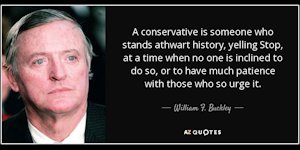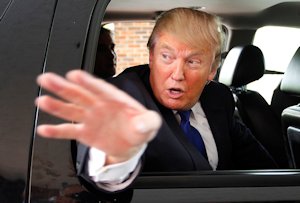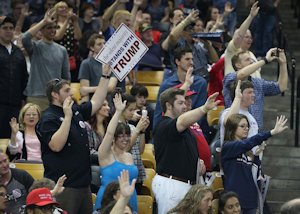Donald Trump vs. Conservatism
 | | It's hard to argue with Bill Buckley |
Miriam Webster defines conservative as "(a) tending or disposed to maintain existing views, conditions, or institutions: traditional; (b) marked by moderation or caution; or (c) marked by or relating to traditional norms of taste, elegance, style, or manners." The word derives largely from the Latin word conservare, which means "to keep safe or intact, preserve, maintain, or spare." It was first used in a political context by disciples of Edmund Burke when discussing his opposition to the French Revolution, and it has come to generally apply to any political philosophy that wishes to safeguard existing or traditional institutions, cultural norms, laws, and practices. In American political discourse, the term usually refers to ideologies on the right of the bipartisan spectrum, normally attributed to the Republican Party.
As such, conservatism in 21st Century America is marked by resistance to radical social change, a distaste for comprehensive reform, and an almost pathological adherence to the Constitution and the Rule of Law. Granted, one could make the case that the Republican Party doesn't always fall in line with this understanding of conservatism; it tends to be interventionist in foreign policy, vocal about the need for major tax reform, and eager to tear down existing rules and regulations that Republicans believe are economically disadvantageous, among much else. In other words, conflating conservatism with Republicanism is problematic and unwise, though the two ideologies are not inherently at odds.
 | | The last president wasn't exactly a conservative either |
During the presidency of Barack Obama, Republicans have garnered a newfound respect for checking executive privilege and urging fiscal discipline they didn't seem terribly interested in during the eight previous years. The Tea Party Movement, which is largely responsible for the Republican victories in 2010 and 2014, claims to be built on these conservative principles, claims to be bringing the Republican Party more in line with its ideological roots. While the Republican Party is seen as obstructionist by those who wish to rush headlong into forced social upheaval, a myriad of comprehensive reforms, and growing federal supremacy, it has been pretty ineffective in actually slowing down the rise of extraconstitutional executive power and big government. To be clear, the Republican Party shares the blame, as the trends have been steady for decades. The Republican Party, therefore, could certainly use a healthy boost of conservatism, if it wishes to appease the disgruntled voters fed up with its ineffectiveness.
And that brings me to Donald Trump. As you most certainly know by now, he is the front-runner to be the Republican nominee for president. This is a man buoyed by the anger and frustration of the Republican Party electorate, a man seen by millions as being the kind of guy who could actually be effective in bringing the change they so desperately seek to the White House. Unfortunately, despite his popularity with many in the Tea Party and the Republican Party, his policy positions are not even remotely conservative.
 | | Trump, looking backward in contempt as he pushes forward |
Conservatism would not favor a president who boasts he will continue to work around Congress whenever he feels the desire to. Conservatism would not favor declaring economic war on one of our greatest international trade partners by forcing her to build a pointless and expensive wall along our southern borders. Conservatism would not favor a man who celebrates and wishes to expand eminent domain abuse. Conservatism would not favor a man who wishes to change party rules in the middle of an election simply because he thinks they're unfair to him. Conservatism would not favor a man who all but advocates riots if he doesn't win according to those same rules. Conservatism would not favor a man whose biggest foreign policy plan is "bomb the hell out of them." We could go on for much longer, but I think you get the point.
The problem here is a cacophony of political desires that are in broad conflict with one another. Many conservatives, upset over too many drastic reforms, overreaching executive actions, sudden social changes, and the growth of big government, now find themselves wanting a strongman in the White House who can affect great change to set right what they think went wrong, but great change is anathema to conservatism. In Trump, they see a guy who doesn't care what others think or say, who will cut through all the political garbage that they believe has kept this country gridlocked for so long. They've invested so much in a certainty that Trump is a conservative messiah (much as many liberals painted Barack Obama as a liberal messiah) that they can't see how truly un-conservative he is, and maybe a good portion of them just doesn't care.
 | | Here we see his supporters awaiting Trump's final solution to that immigrant problem |
Make no mistakes: most Trump supporters like the fact that he's willing to abuse executive power. They want him to. This demonstrates a lack of adherence to the Constitution and the Rule of Law when they find those things inconvenient to getting things done. A conservative cares about following the rules and maintaining checks and balances, whereas most Trump supporters find existing rules annoying obstacles that have held this country back from greatness for too many election cycles. These Trump supporters are as aggravated by government gridlock as the most ardent progressives, believing it's a flaw rather than a feature of the American system.
The Trump divide is ultimately a good thing for the Republican Party, though it may be an enormous setback for conservative dreams of shrinking government and enforcing existing law (instead of adding to it in a perpetual cycle of unintended consequences and unmet promises). This is because it is now out in the open. We can now more clearly identify which Republicans are actually conservatives and which ones are just authoritarians pretending to be conservative. After Trump inevitably crashes and burns (whether that's before or after the primaries), the Republican Party can decide which half of their members it wishes to keep and which half it wishes to cut free.
If you're a conservative, you should know which half you're rooting for.
-e. magill 4/14/2016
|
|